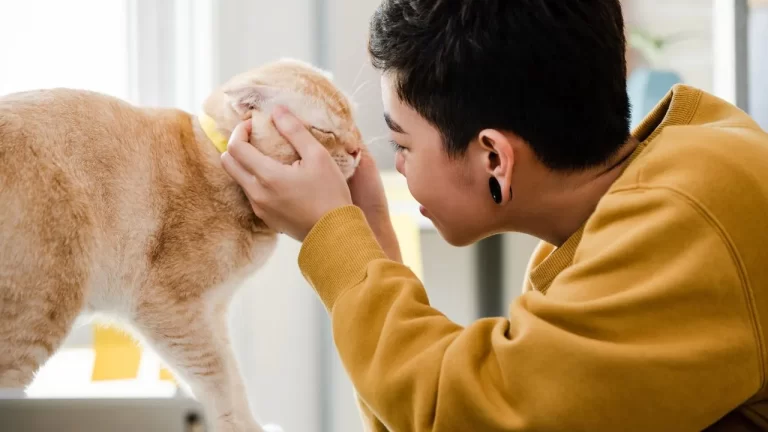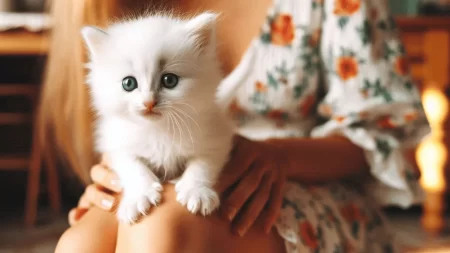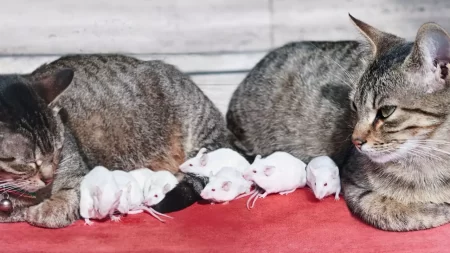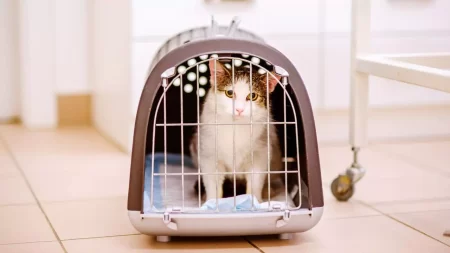Do you ever wonder why your cat ducks when you pet him? You may think he is shy, scared, or annoyed by your touch. But the truth is, there are many possible reasons why your cat behaves this way. And some of them may surprise you.
In this article, we will explore 5 mind-boggling reasons why your cat ducks when you pet him.
We will also give you some tips on how to pet your cat in a way that he enjoys and appreciates.
5 Reasons Why Your Cat Ducks When You Pet Him
- He is uncomfortable or threatened: Some cats may not like being petted on certain parts of their body, such as the head, back, or tail. They may also feel vulnerable or scared if you approach them from above or behind.
- He is not feeling well: If your cat is sick, injured, or in pain, he may not want to be touched at all. He may also duck to avoid further discomfort or irritation.
- He is distracted: Your cat may be focused on something else, such as a bird outside the window, a toy, or another cat. He may not notice your hand until it’s too close and then duck out of reflex.
- He is nervous: Your cat may be shy, skittish, or anxious around people, especially if he has a history of abuse or mistreatment. He may need more time and patience to trust you and enjoy your affection.
- He has different preferences: Every cat has its own personality and likes and dislikes. Some cats may love being petted all over, while others may only tolerate it for a short time or in certain situations. You may need to observe your cat and learn his signals and boundaries.
Do cats naturally duck when they are being petted?
Cats are not naturally inclined to duck when they are being petted. In fact, most cats love being petted and stroked by their owners.
Petting is a way of showing affection and bonding with your cat. It can also help reduce stress and anxiety in both you and your cat.
However, not all cats like being petted the same way. Some cats prefer gentle touches on their cheeks, chin, or ears. Others like being scratched on their back or belly. And some cats don’t like being touched at all.
The way your cat reacts to your petting depends on his personality, mood, health, and history. If your cat ducks when you pet him, it means he is trying to communicate something to you. He may be telling you to stop, slow down or change the way you are petting him.
Why does my cat only duck when I pet him and not when others do?
If your cat only ducks when you pet him and not when others do, it could mean one of two things:
- He trusts you more than others and feels comfortable expressing his preferences to you.
- He doesn’t trust you as much as others and feels threatened or uncomfortable by your touch.
The first scenario is more likely if your cat is generally friendly and affectionate with you. He may duck when you pet him because he knows you will respect his boundaries and stop if he doesn’t like it. He may also duck because he wants you to pet him in a different way or in a different spot.
The second scenario is more likely if your cat is generally aloof or fearful of you. He may duck when you pet him because he doesn’t like being touched by you at all. He may also duck because he associates your touch with something negative, such as pain, punishment, or trauma.
To figure out which scenario applies to your cat, pay attention to his body language and vocalizations. If he purrs, rubs his head against you, or kneads his paws while ducking, it means he enjoys your petting but wants some variation. If he hisses, growls flatten his ears, or swishes his tail while ducking, it means he dislikes your petting and wants you to stop.
How do I know if my cat is enjoying being petted?
The best way to know if your cat is enjoying being petted is to observe his reactions and follow his cues. Here are some signs that your cat is enjoying being petted:
- He purrs loudly and continuously
- He closes his eyes or blinks slowly
- He rubs his head or body against you
- He kneads his paws on you or the surface
- He exposes his belly or rolls over
- He stretches or relaxes his body
Here are some signs that your cat is not enjoying being petted:
- He ducks or moves away from your hand
- He bites or scratches you gently or hard
- He hisses, growls, or spits at you
- He flattens his ears or dilates his pupils
- He swishes his tail or flicks his ears
- He tenses or arches his body
What are some signs that a cat is overstimulated?
Sometimes, a cat may duck when you pet him because he is overstimulated. This means that he has had enough of your touch and needs a break. Overstimulation can happen when you pet your cat too much, too fast, or too hard. It can also happen when your cat is in a high-energy or stressful situation.
Some signs that a cat is overstimulated are:
- He bites or scratches you suddenly and without warning
- He stops purring and starts growling or hissing
- He twitches his skin or shakes his head
- He runs away from you or hides under furniture
- He becomes restless or agitated
If your cat shows any of these signs, stop petting him immediately and give him some space. Let him calm down and approach you again when he is ready.
What are some common problems with cats and petting?
Some common problems that can cause your cat to duck when you pet him are:
- Medical issues: Your cat may have a health problem that makes him sensitive or painful to touch. For example, he may have an ear infection, a dental problem, a skin condition, arthritis, or an injury. If you notice any signs of illness or injury in your cat, such as loss of appetite, weight loss, vomiting, diarrhea, lethargy, limping, or bleeding, take him to the vet as soon as possible.
- Behavioral issues: Your cat may have a behavioral problem that makes him fearful or aggressive towards the touch. For example, he may have been abused, neglected, or traumatized in the past. He may also have a genetic predisposition or a personality trait that makes him shy or nervous. If you suspect that your cat has a behavioral issue, consult a cat behaviorist or a vet for advice and treatment.
- Environmental issues: Your cat may have an environmental problem that makes him stressed or unhappy. For example, he may not have enough space, toys, scratching posts, or hiding places. He may also have to share his territory with other cats or animals that he doesn’t get along with. He may also be exposed to loud noises, strong smells, or unfamiliar people. If you think that your cat has an environmental issue, try to make his home more comfortable and stimulating for him. Provide him with enough resources, enrichment, and privacy. Reduce any sources of stress or conflict in his surroundings.
How can I pet my cat in a way that he likes?
The best way to pet your cat in a way that he likes is to follow these tips:
- Ask for permission: Before you pet your cat, let him sniff your hand and see if he rubs his head or body against it. This is his way of giving you permission to touch him. If he doesn’t do this, don’t force your hand on him. Wait for him to come to you or try again later.
- Start slow: When you pet your cat, start with gentle strokes on his head, cheeks, or chin. These are the areas where cats have scent glands and where they like to be marked by their owners. Avoid touching his ears, eyes, nose, or mouth unless he invites you to do so.
- Follow his lead: As you pet your cat, pay attention to his reactions and preferences. If he moves his head or body towards your hand, it means he wants more of your touch. If he moves away from your hand, it means he wants less of your touch. If he exposes his belly or rolls over, it means he trusts you and wants you to pet his belly. But be careful, some cats may do this as a trap and bite you if you touch their belly.
- Respect his limits: Don’t pet your cat for too long or too hard. Stop when he shows signs of overstimulation or discomfort. Don’t hold him against his will or force him to stay with you. Let him go when he wants to leave.
By following these tips, you can pet your cat in a way that he likes and make him happy.







